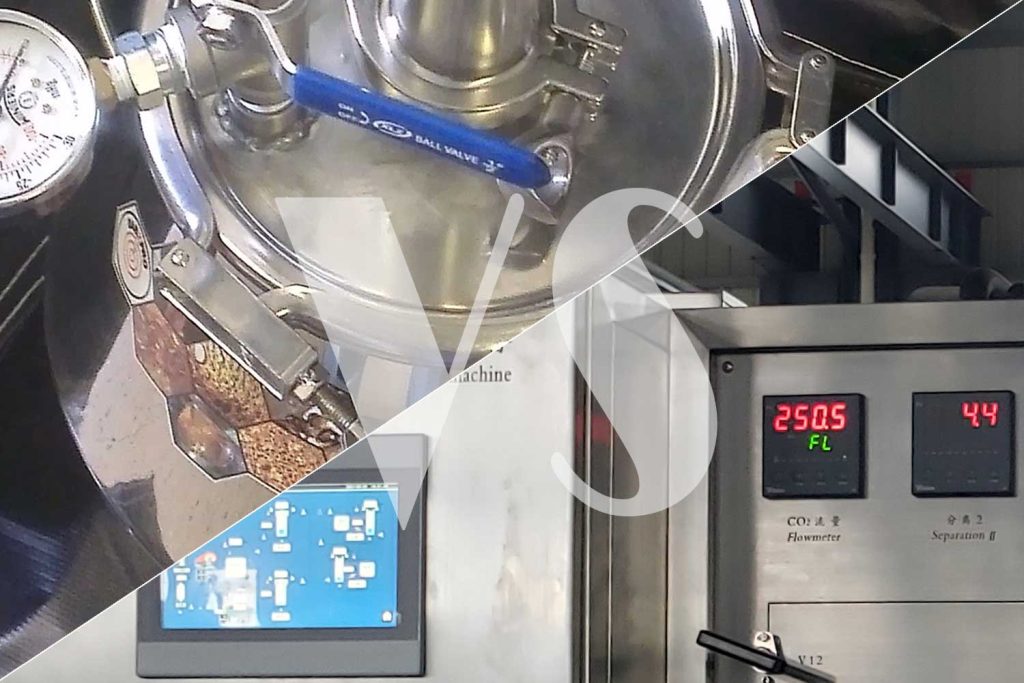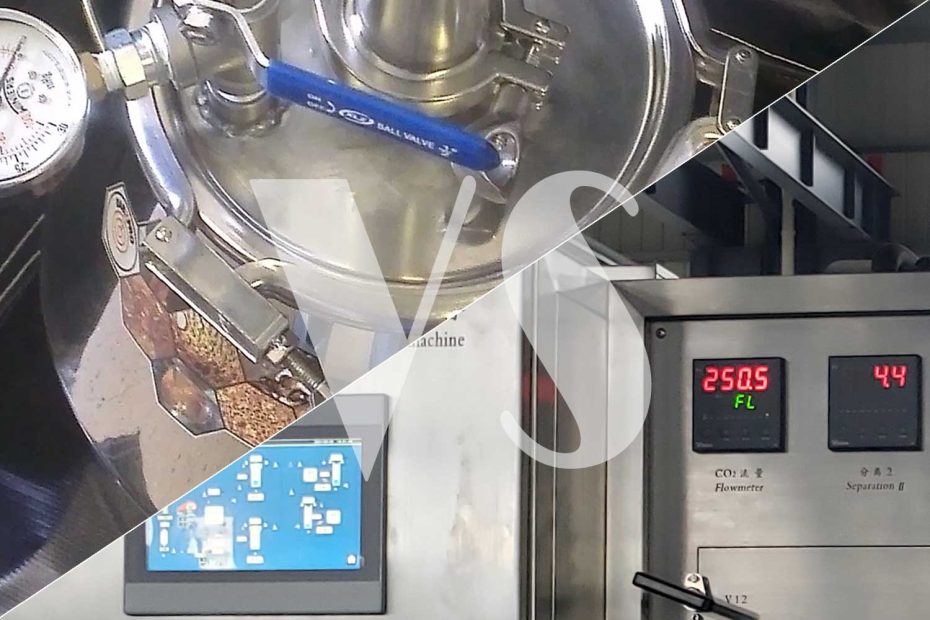
In order to concentrate all the essential oils (such as CBD oils) down into your favorite product, it needs to be extracted from the plant, seeds, or peels of the plant. This is a lot more difficult than it sounds because of the properties of extract and other essential oils.
Just like THC and CBD, as well as terpenes, are not soluble in water. That means that they are not able to dissolve in water in order to remove them from the plant.
A solvent is any chemical like CO2, butane, or propane (hydrocarbons) that can collect and concentrate the essential oils of the cannabis plant. The hydrocarbon extraction or CO2 extraction methods is what produce the high terpene extracts, known as HTE’s. However, there are major differences between the two and how they achieve the same goal of making cannabis extracts.
CO2 extraction
Supercritical CO2 extraction. With CO extraction, it’s able to produce more of a full spectrum product. The CO2 extraction process can able to extract some of the other compounds found in cannabis, such as flavonoids, the carotenoids. The CO2 extraction methods are able to preserve and retain all of the terpenes.
However, this intense process also pulls in more byproducts such as chlorophylls, waxes, and fats into the oil. The other problem is that terpenes and other essential oils can’t be extracted at supercritical levels.
That,s why CO2 extraction machines start with a subcritical extraction at a low pressure and temperature level. All this means that with CO2 extraction, there need to be multiple extractions of the same material at different temperatures and pressures.
Hydrocarbon extraction
Hydrocarbon extraction uses light hydrocarbons such as butane and/or propane. The solvent mixture is washed over the dried or fresh-frozen biomass, which dissolves its chemical compounds such as cannabinoids and terpenes. The solvent with the essential oils is then heated up to evaporate off the butane or propane, leaving behind the extract.
Butane, in particular, is a non-polar and flammable gas. Open blasting techniques have given BHO a bad name due to amateur extractions and poor ventilation that have led to explosions.
Due to the solvent’s low boiling point, processors have been able to preserve more of the plant’s terpenes for better flavor and aroma from their concentrate.
- Cost of production and equipment – Hydrocarbon extraction has lower starting costs than CO2 extraction, which involves expensive equipment.
- Product quality – Hydrocarbon extraction produces extract which is comparable in quality to products produced by other extraction methods. It all depends on the exact type of product you want to produce.
- Output – Hydrocarbon extraction is the most effective and efficient method for extracting the essence of the entire plant.
Which extraction method is better – co2 or hydrocarbon?
Both extraction processes are efficient and safe, and of course there must be a reliable equipment provider. Although we are a CO2 equipment manufacturer, for honesty, I feel that some real voices must be provided
Some objections are explained below:
Hydrocarbon extraction
We often hear debates about the dangers of hydrocarbon concentrates because of concerns about solvent residues in the extract. Yes, in an unprofessional extraction process, there will be toxic solvent residues, which is why we do not recommend individuals to perform hydrocarbon extraction at home, there will be explosions and toxin residues. However, in our daily life, the extraction of edible oils often uses hydrocarbon extraction methods, and that is because professionally manufactured hydrocarbon extracts are completely removed.
Tip: The extraction of hydrocarbons in specialized factories is reliable and safe, with no residues of toxic solvents. But don’t try hydrocarbon extraction at home.
CO2 extraction
In some special CO2 extraction processes, such as the extraction of cannabis, a step is often required: winterization, which uses another solvent – alcohol, which is a reason for the voice of argument. However, in our more than 30 years of extraction experience, there are very few essential oil extraction processes that require winterization. For example, the extraction of essential oils such as vanilla, ginger, and amber does not require winterization, their extracts are essential oils, which do not need to be refined or preservatives. (Because CO2 is a good preservative).
Final thoughts
In essential oil extraction, operators use a co2 or hydrocarbon, each with its own advantages and disadvantages. As long as it is professional equipment used by a professional extraction company, it is a safe and reliable extraction method. Ultimately, there is no perfect solution for every extraction company. The right type of extraction method depends on a variety of factors including the desired end products, the company’s budget, and local laws, among other things.
But in terms of the value of essential oils, the price of essential oils sold in stores marked CO2 extraction is much higher, and many people trust products that do not use any chemical solvents in the extraction process, after all, who wants to purchase a product that’s chocked full of “extra stuff” (i.e. potentially hazardous chemicals). However, the cost of CO2 essential oil extraction equipment is much higher than that of hydrocarbon extraction equipment, which is why CO2 essential oil is expensive.
